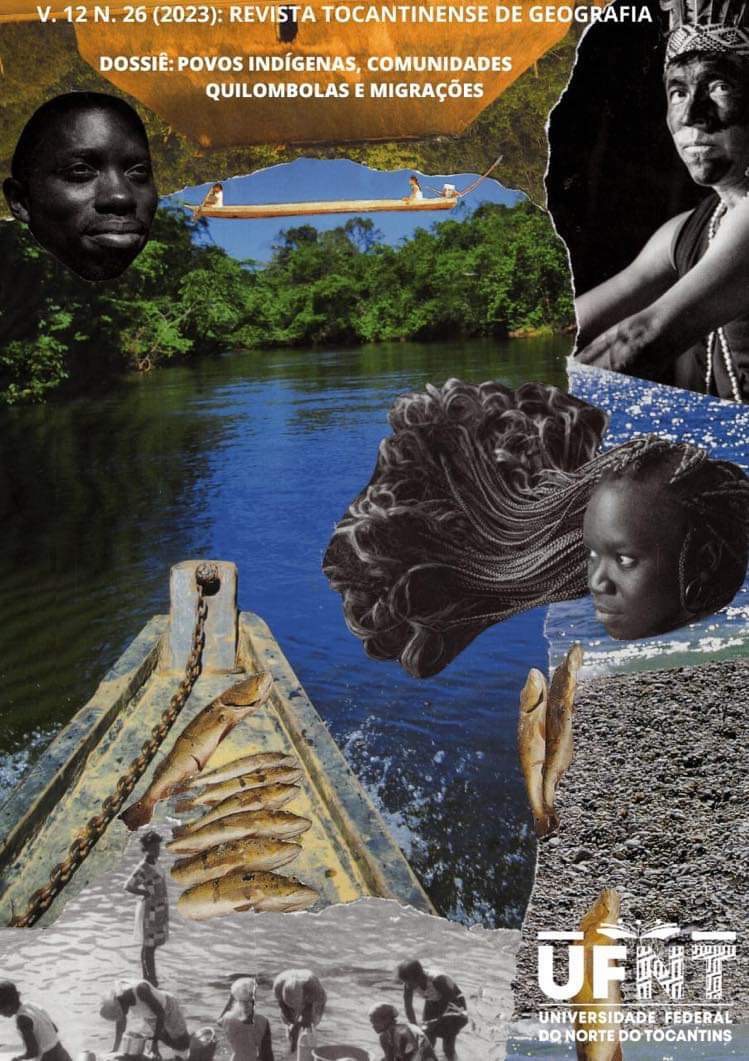“MINHA HISTÓRIA NÃO É DE TER FIM”
O festejo da abolição da comunidade quilombola dona Juscelina
DOI :
https://doi.org/10.20873/rtg.v11i25.15276Mots-clés :
Festejo, Quilombo, Mulheres Quilombolas, Muricilândia-TORésumé
A presente pesquisa tem como objetivo apresentar a relação existente entre as mulheres da Comunidade Quilombola Dona Juscelina e o Festejo da Abolição realizado anualmente no dia 13 de maio. Localizada no perímetro urbano da cidade de Muricilândia-TO, o Quilombo Dona Juscelina se encontra a 60 quilômetros da cidade de Araguaína-TO com acesso pela rodovia TO-222, presente tanto na região norte do estado do Tocantins quanto na região norte do país. A celebração que ocorre no dia 13 de maio é um evento construído pela comunidade e para a comunidade, e por estarem em um ambiente urbano, é também um evento que movimenta a cidade e desde o seu início em 1968, a organização da festa tem como protagonista a matriarca dona Juscelina, e juntamente com ela outras mulheres da comunidade. O percurso metodológico realiza-se por meio de uma pesquisa qualitativa usando de depoimento pessoal e observação participante como instrumentos de pesquisa. O recorte espacial é a Comunidade Quilombola Dona Juscelina em Muricilândia-TO, e as participantes da pesquisa são as mulheres que organizam o Festejo da Abolição. A partir dessa pesquisa é possível compreender a relação existente entre as mulheres protagonistas da comunidade e a realização do festejo, percebendo o lugar/local que a mulher ocupa neste espaço social.
Références
BONNEMAISON, Jöel. Viagem em torno do território. In: CORRÊA, Roberto Lobato; ROSENDAHL, Zeny. Geografia Cultural: uma antologia. Rio de Janeiro: EdUERJ, vol. II, 2002. p. 279-304.
BONNEMAISON, Joël. La Géographie culturelle. Paris: Éditions du CTHS, 2000.
BRASIL. Art. 13 (ADCT), 5 de outubro de 1988. É criado o estado do Tocantins, pelo desmembramento da área descrita neste artigo, dando-se sua instalação no quadragésimo sexto dia após a eleição prevista no § 3º, mas não antes de 1º de janeiro de 1989. Disponível em: https://www.stf.jus.br/portal/constituicao/artigoBd.asp?item=2150#:~:text=A%20cria%C3%A7%C3%A3o%20do%20Estado%20do%20Tocantins%20deu%2Dse%20com%20a,13. Acesso em: 24 de junho de 2022.
CLAVAL, Paul. A Geografia Cultural. Florianópolis: Ed. da UFSC, 2001.
DEALDINA, Selma dos Santos (Org). Mulheres quilombolas: territórios de existências negras femininas. São Paulo: Sueli Carneiro: Jandaíra, 2020.
FROCHTENGARTEN, Fernando. A memória oral no mundo contemporâneo. Estudos Avançados, v. 19, n. 55, São Paulo, Sept./Dec. 2005, p. 367-376.
HAESBAERT, R. Identidades Territoriais. In. ROSENDAHL, Z e CORRÊA, R. (Orgs). Manifestações da Cultura no espaço. Rio de Janeiro: EdUERJ, 1999.
HAESBAERT, Rogério. Des-territorialização e identidade. Niterói-RJ: Editora da UFF, 1997.
JOFFILY, Olivia Rangel. O corpo como campo de batalha. In: PEDRO, Joana Maria; WOLF, Cristina Scheibe. Gênero, feminismo e ditaduras no Cone Sul. Florianópolis: Ed. Mulheres, 2010, p. 225-245.
OKIN, Susan Moller. Gênero, o público e o privado. Estudos Feministas. Florianópolis, v. 16, n. 2, p. 305-332, mai./ago. 2008.
OLIVEIRA, Izarete da Silva de. Território e Territorialidade nos Limites do Rural e Urbano na Comunidade Quilombola Dona Juscelina em Muricilândia – TO. Dissertação de Mestrado – Programa de Pós-Graduação em Estudos de Cultura e Território. Araguaína: UFT, 2018.
RIBEIRO, Djamila. O que é lugar de fala? Belo Horizonte-MG: Letramento: Justificando, 2017.
SANTOS, Geilza da Silva. Mulheres Quilombolas: Território, pertencimento e identidade na Comunidade Negra Senhor do Bonfim - Areia-PB. XI Encontro Regional Nordeste de História Oral. Ficção e Poder: oralidade, imagem e escrita. Fortaleza-CE, 2017.
SANTOS, Katiane da Silva. DO PASSADO AO PRESENTE: A Festa da Comunidade Quilombola Dona Juscelina em Muricilândia-TO. Dissertação de Mestrado – Programa de Pós-Graduação em Estudos de Cultura e Território. Araguaína: UFT, 2018.
SAQUET, Marcos Aurélio. Abordagens e concepções sobre território. 1. ed. São Paulo: Expressão Popular, 2007.
SILVA, Raimunda Patrícia Gemaque da. O Lado Feminino do Quilombo: o território quilombola sobre o enfoque de gênero nas comunidades de Boa Vista e Moura, em Oriximiná-PA. Dissertação de Mestrado – Programa de Pós-Graduação em Geografia. Porto Velho/RO: UNIR, 2016.
SOUZA, Laura Olivieri Carneiro de. Quilombos: identidade e história. 1. ed. Rio de Janeiro: Nova Fronteira, 2012.
WEIL, Simone. O enraizamento. Em A condição operária e outros estudos sobre a opressão. Antologia organizada por Ecléa Bosi. 2. ed. ver. Rio de Janeiro, Paz e Terra, 1996, p. 411-412.
WEIL, Simone. O desenraizamento operário. Em A condição operária e outros estudos sobre a opressão. Antologia organizada por Ecléa Bosi. 2. ed. ver. Rio de Janeiro, Paz e Terra, 1996, p. 413-440.
Téléchargements
Publié-e
Comment citer
Numéro
Rubrique
Licence
© Journal de géographie Tocantinense 2023

Cette œuvre est sous licence Creative Commons Attribution - Pas d'Utilisation Commerciale - Pas de Modification 4.0 International.
Revista Tocantinense de Geografia ne rémunère aucun auteur pour la publication de ses textes. Le contenu des textes publiés dans cette revue relève de la responsabilité des auteurs.









.png)












